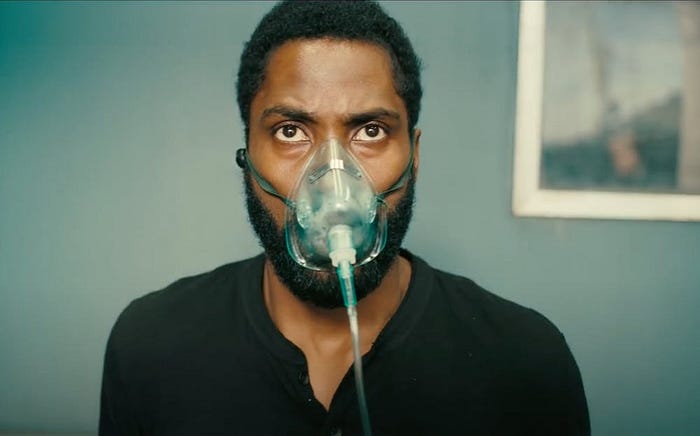Tenet: Who is the Protagonist?
The main character, played by John Washington, aptly called The Protagonist, is a pastiche to all the Bond-esque leading characters in espionage films. There could be many reasons as to why the Protagonist is not given a name.

It’s not about the name, it’s about the journey.
Who is the nameless protagonist? What makes him important? The protagonist’s true identity and role in the mission are just as much of a mystery to him as it is to the audience. Interestingly, while watching the film, we are less concerned about knowing his name. In fact, by not naming him, the focus is on his journey as he learns about the temporal pincer movement, stops Sator’s evil plan, and discovers his actual role in the mission. One of the biggest plot twists in the film is the revelation that he is not only a hired secret agent but is in charge of the mission. Everyone, including himself, has been working for him. He is the character whose identity and role shifts by the end of the film. Leaving the protagonist nameless, draws attention to his actions, qualities, and how the mission affects his character arc as he shifts from an unknowing agent to the mastermind behind the plan to save the world.
The Plot
By definition, the protagonist propels the story FORWARD. We often see the story unfolding through his perspective and following the sequence of events as he sees it. In a film where different characters move forward and backward at different times, the storyline can be confusing. By labelling Washington’s character as the Protagonist, it makes it clear that we follow his chronology in the film.
The Hero Trope
Referring to the leading character as the Protagonist is congruent to affirming that he is THE good guy, the hero of the story. The title of the Protagonist was first given to John Washington’s character by Priya, “To get anywhere near Sator will take a fresh-faced fresh protagonist. And you are fresh as a daisy.” This is a nod to the action film trope that a one-of-kind hero is needed to defeat the ultimate villain. Throughout the film, John Washington plays a heroic, undeniably skilled and experienced secret agent. He makes sacrifices to save others, whether it is his teammates or damsels (Kat) in distress. Identifying him as the protagonist could be Nolan’s way of blatantly telling his audience he is the good guy.
So…that makes Andrei Sator the Antagonist, right?

The Villain
On the surface, Andrei Sator is made out to be a straight forward villain. A greedy and selfish Russian oligarch who mistreats his wife and plans to end the world. Everyone believes that he wants to cause a mass extinction for selfish reasons. He’s dying and can’t have the world. As Kat puts it “If he can’t have it, no one can.” This makes him an outright antagonist. So why isn’t he given the title?
The word “antagonist” in the film is only used whenever the main characters are referring to someone they are fighting against, such as Sator’s men. However, Sator is never referred to as the antagonist.
Sator is a Protagonist
There’s more to Sator than meets the eye. In fact, his intentions are actually misunderstood. Sator can be perceived as a protagonist. At least, in his own eyes. For starters, it isn’t his idea to orchestrate a plan to end the world. During his “villain monologue” where he explains his plans over a walkie-talkie, he reveals that he was chosen by an unknown person or organization in the future to assemble the doomsday device, the Algorithm. He knows that the future of the Earth is in peril due to climate change. He believes that by destroying the present time, he can prevent the future.
“I want to create a new world. Somewhere, once, a man in a crystal tower presses a switch, and Armageddon is both triggered and prevented. Time itself changes direction. The sunshine we enjoyed will warm the faces of our descendants… their garden rose and their rivers dried up. They have no choice but to turn around. We are to blame for that. Now that you know this, do you still want me to stop?”
In his eyes, he is the protagonist saving the world. With that in mind, is he truly villainous, or is he just trying to justify an unorthodox means?
Multiple Protagonists
When Priya says, “You… are one protagonist. Did you think you were the only one capable of saving the world?” She is criticizing the Protagonist for being vain in thinking that no one else is good enough to be the hero besides him and that only he has an important role in the mission. Perhaps this is also a criticism towards the heroes of action films who are portrayed to be the most important characters, with little praise or acknowledgement in the crucial role that secondary characters play, like sidekicks. For instance, Neil and Ives are also protagonists in a sense. Without them, it’s doubtful that a nameless Protagonist would be successful in the mission.
According to Priya, a protagonist is someone “capable of saving the world”. In this regard, there is more than one protagonist in Tenet besides Washington’s character. Secondary characters, like Neil, whose skills and knowledge are crucial to the mission, or Kat, who can get close enough to Sator to end him, are protagonists as their actions help save the world. As aforementioned, even Sator himself can be seen as a protagonist since his intentions and plans were meant to prevent a climate apocalypse.
Visit our website www.tfphk.com for more articles like this!
Photo Source: Tenet. Christopher Nolan. Warner Bros. Pictures, 2020. Film
Disclaimer: Any views and opinions expressed are personal and solely belong to the authors. They are not intended to malign any religion, ethnic group, club organisation, company, individual or anyone or anything.
